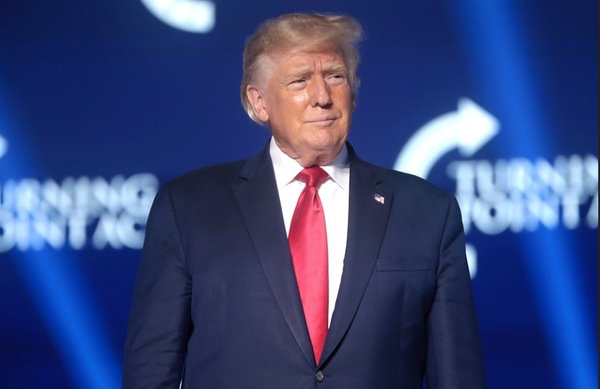
–>
January 31, 2023
Donald Trump was a great, if imperfect, president. By the third year of his presidency, the country was flourishing. The economy was roaring, jobs were up, incomes were up, gas prices were down, and America and Americans were doing fairly well.
‘); googletag.cmd.push(function () { googletag.display(‘div-gpt-ad-1609268089992-0’); }); }
But then a funny thing happened on the way to the election. The swamp struck back via Covid and the George Floyd protests. Neither of those was of Trump’s making, but Democrats used both to steal the election. The Democrats didn’t create Covid or put Floyd in the morgue, but they used the lockdowns and the riots to sufficiently upend American life so that they could steal the election under the cover of chaos.
Those were tests, and Donald Trump failed. With Covid, he allowed the country to be misled by a snake oil salesman and, with the Floyd protests, he didn’t send in the troops. It’s easy to understand, of course, why he failed.
Anthony Fauci had played a role in America’s various health crises for decades and was an internationally respected doctor. As the media was hyping the idea that the virus could wipe out mankind, Fauci was a voice of calm, reassuring the country that, with distance, masks, and lockdowns, we would persevere.
‘); googletag.cmd.push(function () { googletag.display(‘div-gpt-ad-1609270365559-0’); }); }
At the same time, when Trump raised questions about anything that diverged from the Big Pharma/media narrative or suggested we should remember the economic costs of lockdowns, the media, medical people, and scientists attacked, lampooned, and vilified him unmercifully. Given the fusillade facing him, it’s not a surprise that Trump couldn’t recognize the lies the American people were being served.

Image: Donald Trump by Gage Skidmore. CC BY-SA 2.0.
On the George Floyd-inspired Antifa/BLM riots, Trump failed, and that’s on him, although again, one can see why he acted the way he did. As one article explains, Section 252 of the Insurrection Act
permits deployment (of military troops) in order to “enforce the laws” of the United States or to “suppress rebellion” whenever “unlawful obstructions, combinations, or assemblages, or rebellion” make it “impracticable” to enforce federal law in that state by the “ordinary course of judicial proceedings.”
Thus, Trump could have used the military to stop the violence that cities were unwilling or unable to stop. Trump knew this, saying in early June 2020, “If a city or a state refuses to take the actions that are necessary to defend the life and property of their residents then I will deploy the United States military and quickly solve the problem for them.” The Democrats pilloried him, with Pelosi stating: “But there is no reason for the U.S. military to be called out for this.”
Trump chose not to act, likely because he knew Democrats would brand him a tyrant or dictator if he did, despite the fact that FDR, Kennedy, LBJ, and Bush 41 all used troops for far smaller riots. His forbearance was irrelevant because Democrats attacked him anyway for thinking about troops.
That Donald Trump failed at leading the country through those two disasters is, sadly, understandable. Given the savagery and breadth of the relentless attacks on him, it would have taken someone just short of Zeus to have succeeded. The result of that failure was that Democrats stole the election, and Trump lost the White House.
‘); googletag.cmd.push(function () { googletag.display(‘div-gpt-ad-1609268078422-0’); }); } if (publir_show_ads) { document.write(“
Fast forward two years. In November, Trump announced he was running, and he said many of the right things, starting with “In order to make America great and glorious again. I am tonight announcing my candidacy for president of the United States.” Possibly the best line of the night was, “But just as I promised in 2016, I am your voice. I am your voice. The Washington establishment wants to silence us, but we will not let them do that.”
That all sounds great, but the question is: Has Trump learned the hard lesson… that the swamp is the Terminator, it will not stop, it cannot be negotiated with, the swamp knows no parties or limits, and it must be crushed? Otherwise, it will kill him, kill his supporters and kill the Republic of the United States.
Recent events seem to suggest that he has not learned.
First, he endorsed Dr. Oz over a rock-solid MAGA candidate in Pennsylvania. Oz was anything but MAGA and went on to lose to a literally brain-damaged Democrat. Trump made other MAGA endorsements, but Pennsylvania’s was for one of the most important swing states in the nation, and he blew it.
Next, in December, he endorsed the decidedly not MAGA Kevin McCarthy for Speaker even though there were several MAGA candidates in the running. In 2021, McCarthy stated, “I don’t think anybody is questioning the legitimacy of the presidential election.” That’s true, except for virtually every single MAGA voter in America and 70% of the larger GOP as well.
Then, earlier this month, Trump threw his most ardent supporters, the pro-life movement, under the bus, stating, “It was the ‘abortion issue,’ poorly handled by many Republicans…that lost large numbers of Voters.” He continued, “Also, the people that pushed so hard, for decades, against abortion, got their wish from the U.S. Supreme Court, & just plain disappeared, not to be seen again.” That was completely unnecessary and wrong, to boot.
Then, quixotically, he invited the biggest dolt in Congress, Senator Lindsey Graham, who actually proposed a nationwide abortion ban less than two months before the election, to be with him at his first campaign event! Most Republicans despise the warmonger and big-spending Graham, behind only McConnell and perhaps Collins, Murray, and Romney.
Then, finally, despite six years of failure, Trump supported the grifter Ronna McDaniel to lead the Republican Party over the incomparable super lawyer and MAGA candidate Harmeet Dhillon. If there was ever anyone in the Republican Party who should’ve been ousted and replaced by a dyed-in-the-wool grassroots MAGA candidate, it was McDaniel.
McDaniel was recently revealed to have spent over $2 million from the RNC treasury on luxury travel and private jets, $300,000 on flowers, $75,000 on “beauty and spa treatments,” and $1,280 on LBGTQ+ filings! She did all of this while undermining MAGA candidates in the midterms.
McDaniel is the antithesis of the grassroots MAGA voter. She is the polar opposite of the farmers, plumbers, police, truckers, and steel workers who put Trump into office in the first place and the ones who recognized the coup. They’re the 50,000 people who filled stadiums and were in the trenches with him. But McDaniel and the establishment loathe them.
If Trump circa 2024 hasn’t figured out that success lies with the grassroots MAGA voters who put him in the White House rather than with the establishment grifters who lead the party today—with his help—then I’m not sure what the motivation is to support him is.
2024 is too important a moment in American history to let serial failures like the establishment McFailures (McConnell, McCarthy, and McDaniel) lead the way. This election may well be the last opportunity for Americans to rescue the nation from a Democrat party that has turned our cities into dystopian wastelands, turned 40% of American children into gender-confused lab rats, and seeks to balkanize the nation based on race, sex and anything else the swamp’s denizens can think of. The swamp’s goal is power, and it knows no party. McDaniel & Co. is its GOP arm, and if Trump doesn’t recognize that, then the baggage that comes with supporting him isn’t worth the fight because, with those charlatans leading the way, come January 20, 2025, there will be another Democrat being sworn in.
Follow Vince on Twitter at @ImperfectUSA.
<!– if(page_width_onload <= 479) { document.write("
“); googletag.cmd.push(function() { googletag.display(‘div-gpt-ad-1345489840937-4’); }); } –> If you experience technical problems, please write to [email protected]
FOLLOW US ON
<!–
–>
<!– _qoptions={ qacct:”p-9bKF-NgTuSFM6″ }; ![]() –> <!—-> <!– var addthis_share = { email_template: “new_template” } –>
–> <!—-> <!– var addthis_share = { email_template: “new_template” } –>






